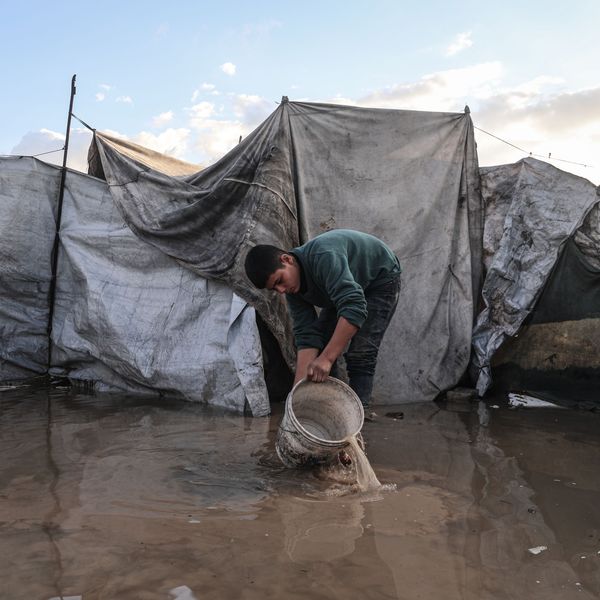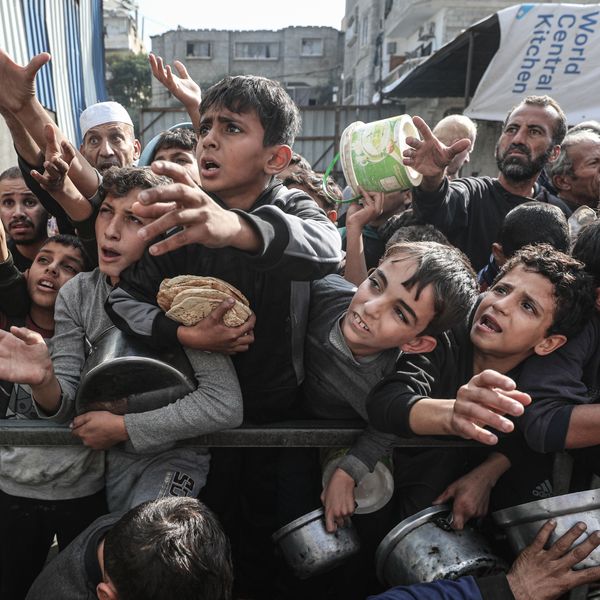UN Official: Israeli Blockade Has Made Gaza 'Uninhabitable'
'First and foremost, the Israeli blockade—which is illegal—must be lifted.'
A year after Israel ended its 8-day bombardment of Gaza, a UN official has warned that the blockaded territory has become "uninhabitable."
Outgoing Commissioner General of United Nations Relief and Works Agency for Palestine Refugees in the Near East (UNRWA), Filippo Grandi, urged the international community to address the crisis in Gaza, stating Tuesday, "Gaza is quickly becoming uninhabitable, and further conflict is bound, as before, to affect civilians in Gaza and southern Israel, unless its causes are addressed."
Grandi also stated that regional security necessitates an end to the illegal Israeli blockade and military strikes.
"Perhaps strengthening the human security of the people of Gaza is a better avenue to ensuring regional stability than physical closures, political isolation and military action," Grandi stated. "To obtain this, first and foremost, the Israeli blockade--which is illegal--must be lifted. Meanwhile, the United Nations must be allowed to at least continue construction projects and provide a few extra jobs to the beleaguered population."
Oxfam International also issued a warning on the situation in Gaza, stating that the Israeli blockade has meant worsening power shortages that "are restricting the provision of basic services such as healthcare and water, and affecting an already vulnerable economy," and led to a pumping station spewing out thousand liters of sewage into the streets. "This is the start of a catastrophe and unless the world listens to our cries, a real disaster may hit Gaza and its people," said Sa'ad El-Deen Al-Tbash of the Gaza City wastewater department.
"Ordinary people in Gaza are struggling to find work and feed their families while the blockade remains in place," Nishant Pandey, head of Oxfam in the Occupied Palestinian Territory and Israel, said in a statement.
Further, Oxfam states, the ceasefire agreed to 12 months ago has included Israel conducting "over 300 incidents of border and naval fire - half of them against fishermen at sea."
Al Jazeera adds:
According to a recent report by OCHA, 10,000-20,000 litres of fuel entered Gaza in one week in November, compared to 1 million litres a day six months ago. It warned that basic functions such as providing water, sanitation and health services were increasingly difficult.
"The operation of 291 water and sewage facilities have been severely affected, and access to running water has declined across the Gaza Strip," the OCHA said.
Food, medicine, computers, cars, livestock and construction materials used to be smuggled through the tunnels, serving a vital role for Gaza's economy. A recent report by the EuroMid Observer for Human Rights estimates economic losses caused by the closure of the tunnels totalled $460m over the past two months.
Adding to the crisis, Israel has halted almost all construction material from entering through its crossing following the discovery of a tunnel between Gaza and Israel in October.
___________________
An Urgent Message From Our Co-Founder
Dear Common Dreams reader, The U.S. is on a fast track to authoritarianism like nothing I've ever seen. Meanwhile, corporate news outlets are utterly capitulating to Trump, twisting their coverage to avoid drawing his ire while lining up to stuff cash in his pockets. That's why I believe that Common Dreams is doing the best and most consequential reporting that we've ever done. Our small but mighty team is a progressive reporting powerhouse, covering the news every day that the corporate media never will. Our mission has always been simple: To inform. To inspire. And to ignite change for the common good. Now here's the key piece that I want all our readers to understand: None of this would be possible without your financial support. That's not just some fundraising cliche. It's the absolute and literal truth. We don't accept corporate advertising and never will. We don't have a paywall because we don't think people should be blocked from critical news based on their ability to pay. Everything we do is funded by the donations of readers like you. Will you donate now to help power the nonprofit, independent reporting of Common Dreams? Thank you for being a vital member of our community. Together, we can keep independent journalism alive when it’s needed most. - Craig Brown, Co-founder |
A year after Israel ended its 8-day bombardment of Gaza, a UN official has warned that the blockaded territory has become "uninhabitable."
Outgoing Commissioner General of United Nations Relief and Works Agency for Palestine Refugees in the Near East (UNRWA), Filippo Grandi, urged the international community to address the crisis in Gaza, stating Tuesday, "Gaza is quickly becoming uninhabitable, and further conflict is bound, as before, to affect civilians in Gaza and southern Israel, unless its causes are addressed."
Grandi also stated that regional security necessitates an end to the illegal Israeli blockade and military strikes.
"Perhaps strengthening the human security of the people of Gaza is a better avenue to ensuring regional stability than physical closures, political isolation and military action," Grandi stated. "To obtain this, first and foremost, the Israeli blockade--which is illegal--must be lifted. Meanwhile, the United Nations must be allowed to at least continue construction projects and provide a few extra jobs to the beleaguered population."
Oxfam International also issued a warning on the situation in Gaza, stating that the Israeli blockade has meant worsening power shortages that "are restricting the provision of basic services such as healthcare and water, and affecting an already vulnerable economy," and led to a pumping station spewing out thousand liters of sewage into the streets. "This is the start of a catastrophe and unless the world listens to our cries, a real disaster may hit Gaza and its people," said Sa'ad El-Deen Al-Tbash of the Gaza City wastewater department.
"Ordinary people in Gaza are struggling to find work and feed their families while the blockade remains in place," Nishant Pandey, head of Oxfam in the Occupied Palestinian Territory and Israel, said in a statement.
Further, Oxfam states, the ceasefire agreed to 12 months ago has included Israel conducting "over 300 incidents of border and naval fire - half of them against fishermen at sea."
Al Jazeera adds:
According to a recent report by OCHA, 10,000-20,000 litres of fuel entered Gaza in one week in November, compared to 1 million litres a day six months ago. It warned that basic functions such as providing water, sanitation and health services were increasingly difficult.
"The operation of 291 water and sewage facilities have been severely affected, and access to running water has declined across the Gaza Strip," the OCHA said.
Food, medicine, computers, cars, livestock and construction materials used to be smuggled through the tunnels, serving a vital role for Gaza's economy. A recent report by the EuroMid Observer for Human Rights estimates economic losses caused by the closure of the tunnels totalled $460m over the past two months.
Adding to the crisis, Israel has halted almost all construction material from entering through its crossing following the discovery of a tunnel between Gaza and Israel in October.
___________________
A year after Israel ended its 8-day bombardment of Gaza, a UN official has warned that the blockaded territory has become "uninhabitable."
Outgoing Commissioner General of United Nations Relief and Works Agency for Palestine Refugees in the Near East (UNRWA), Filippo Grandi, urged the international community to address the crisis in Gaza, stating Tuesday, "Gaza is quickly becoming uninhabitable, and further conflict is bound, as before, to affect civilians in Gaza and southern Israel, unless its causes are addressed."
Grandi also stated that regional security necessitates an end to the illegal Israeli blockade and military strikes.
"Perhaps strengthening the human security of the people of Gaza is a better avenue to ensuring regional stability than physical closures, political isolation and military action," Grandi stated. "To obtain this, first and foremost, the Israeli blockade--which is illegal--must be lifted. Meanwhile, the United Nations must be allowed to at least continue construction projects and provide a few extra jobs to the beleaguered population."
Oxfam International also issued a warning on the situation in Gaza, stating that the Israeli blockade has meant worsening power shortages that "are restricting the provision of basic services such as healthcare and water, and affecting an already vulnerable economy," and led to a pumping station spewing out thousand liters of sewage into the streets. "This is the start of a catastrophe and unless the world listens to our cries, a real disaster may hit Gaza and its people," said Sa'ad El-Deen Al-Tbash of the Gaza City wastewater department.
"Ordinary people in Gaza are struggling to find work and feed their families while the blockade remains in place," Nishant Pandey, head of Oxfam in the Occupied Palestinian Territory and Israel, said in a statement.
Further, Oxfam states, the ceasefire agreed to 12 months ago has included Israel conducting "over 300 incidents of border and naval fire - half of them against fishermen at sea."
Al Jazeera adds:
According to a recent report by OCHA, 10,000-20,000 litres of fuel entered Gaza in one week in November, compared to 1 million litres a day six months ago. It warned that basic functions such as providing water, sanitation and health services were increasingly difficult.
"The operation of 291 water and sewage facilities have been severely affected, and access to running water has declined across the Gaza Strip," the OCHA said.
Food, medicine, computers, cars, livestock and construction materials used to be smuggled through the tunnels, serving a vital role for Gaza's economy. A recent report by the EuroMid Observer for Human Rights estimates economic losses caused by the closure of the tunnels totalled $460m over the past two months.
Adding to the crisis, Israel has halted almost all construction material from entering through its crossing following the discovery of a tunnel between Gaza and Israel in October.
___________________

